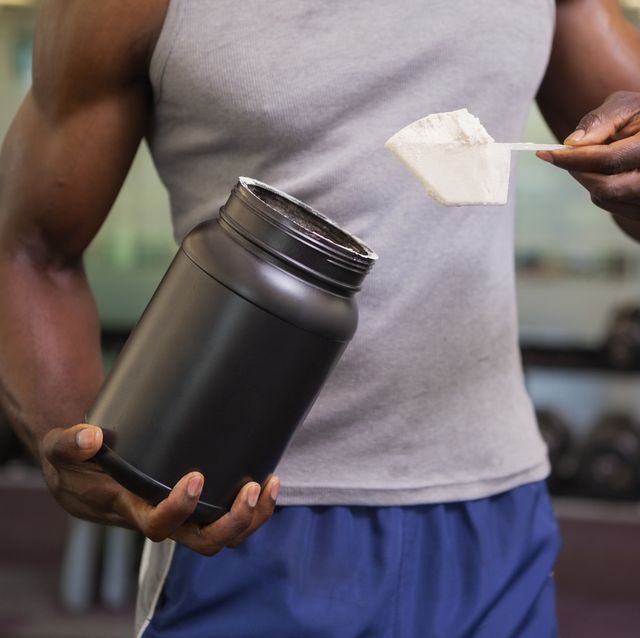TAKE A LOOK in your supplement cabinet. You might have a few jugs of protein powder that have been sitting there for a while. Investigate the label and you'll find an expiration date printed on the side. Does protein powder really expire?
Unfortunately, the answer is yes. That expensive tub of high quality whey you invested in months ago won't last forever. It doesn't spoil in the same obvious way that meat or dairy does, though (thank goodness). That might make it difficult to identify when a protein powder is usable or not, especially if you're not paying attention to the printed date. You might want to think twice about reaching for that old tub to add a scoop or to your post workout shake. If you're trying to up your protein intake, it could be worth investing in a new product.
The good news is consuming expired protein powder won't wreak havoc on your gut the same way expired meat or dairy will. If you accidentally toss some into your morning smoothie, don't worry too much about it making you sick. It might be okay to use, but it probably won't be effective.
“Generally, consuming a protein powder a few weeks or even months after the date on the container is safe, but the quality of the protein will begin to decrease,” says Chris Henigan, M.S., R.D., L.D.N., of Simple Start Nutrition. It might look and taste just fine, but the powder won't be as effective at doing its job when it passes its prime. That might mean it's time for a new one.
If something really funky is happening inside your jug, though, it may be best to err on the side of caution. If your powder has developed an off flavor or odor, or has been stored in an environment that is not ideal (too hot/damp/wet), it's probably best to toss it, says Kieran McSorley, R.D., of Brentwood Physiotherapy.
We dove a little deeper to see whether finishing up that tub is worth the risk.
When Does Protein Powder Expire?
The short answer: You'll see an expiration date anywhere from six months to a year on the packaging, depending on the kind of protein powder you're buying.
The longer answer: It's actual expiration really depends on how you're storing it.
“Some protein powders put an expiration date on their package, but they are not legally required to [do so],” says Henigan. “Expiration dates or even best by dates suggests this is the date at which the product becomes less than optimal. Meaning, after this date, the product is generally safe to consume but can be lower in protein content due to degradation of the product.”
Henigan says that most research indicates if your protein powder is properly stored (no extreme temperatures or humidity), it should be safe to consume for up to two years. The product quality may diminish after its posted date, but that "doesn't necessarily mean the powder will be unsafe to consume after that date,” says McSorely.
That's because a dry environment within the jug makes it nearly impossible for microbes to grow within the powder, says Bob Roberts, Ph.D., a professor of food science at Penn State University. Same goes for plant-based protein powders too.
So unless you’re storing your canisters in a warm, humid place (like the bathroom or your gym locker), you’re likely not going to get yourself sick.
All that said, there are a few other things to consider.
What Happens to Protein Powder After It Expires?
As for the muscle-building mojo of protein powder, it does diminish after the use-by date has passed.
You can blame a chemical reaction called Maillard browning: The protein reacts with sugar left over from when the manufacturers extracted the whey from the milk, resulting in a gradual breakdown of the amino acid lysine.
“If you lose lysine, then the powder will not be as complete of a protein,” says Roberts.
That means less muscle-building power for your powder.
Can Expired Protein Powder Hurt You?
Taking expired protein powder may not cause any immediate health issues, but it may not be as effective as protein powder that hasn’t expired.
“Over time, the potency of the protein and other nutrients in the powder can degrade, making it less effective for building and repairing muscle tissue,” says McSorley. “Additionally, the powder may develop an off flavor or odor, which can make it unpleasant to consume.”
In terms of physical problems, you may be in for a treat. “If the protein powder has gone bad you can get sick, likely with stomach pain, nausea, possibly vomiting,” says Henigan.
Time to check those labels!
How to Tell if Your Protein Powder Has Gone Bad
If you're well beyond your expiration date, Henigan says that some ways to tell if your protein powder has gone bad include a bad smell, changes in color, or clumping.
If you're only a day or two paste the posted date, try putting a bit of it on your tongue. Another telltale sign of Maillard browning is a fade in flavor, says Roberts. If you taste cardboard, toss the protein powder.
And your protein powder has always tasted like cardboard, then no wonder the stuff sat around for so long.
Maybe it’s time to go shopping for a new brand. May we suggest a few?
How to Keep Protein Powder Fresh
To preserve the shelf life of your protein powder, store it somewhere cool and dark, says Henigan, and be sure to keep the scooper dry.
“Always close the lid tightly after each use to prevent oxidation and contamination,” says McSorley. You might also want to consider transferring the powder to an airtight container, such as a mason jar, to further protect its freshness. Worth noting: Some gym buffs may find individually wrapped protein powder packets are more handy, and thanks to this packaging format, freshness may be ensured for longer.

Paul Kita is a Deputy Editor at Men's Health, where he has covered food, cooking, nutrition, supplements, grooming, tech, travel, and fatherhood at the brand for more than 15 years. He is also the author of two Men's Health cookbooks, Guy Gourmet and A Man, A Pan, A Plan, and the winner of a James Beard Award.
Perri is a New York City-born and -based writer; she holds a bachelor’s in psychology from Columbia University and is also a culinary school graduate of the plant-based Natural Gourmet Institute, which is now the Natural Gourmet Center at the Institute of Culinary Education. Her work has appeared in the New York Post, Men's Journal, Rolling Stone, Oprah Daily, Insider.com, Architectural Digest, Southern Living, and more. She's probably seen Dave Matthews Band in your hometown, and she'll never turn down a bloody mary. Learn more at VeganWhenSober.com.
Cori Ritchey, C.S.C.S., is an Associate Health & Fitness Editor at Men's Health, a certified strength and condition coach, and group fitness instructor. She reports on topics regarding health, nutrition, mental health, fitness, sex, and relationships. You can find more of her work in HealthCentral, Livestrong, Self, and others.

Erin Kenney is a Registered Dietitian, personal trainer, and CEO of Nutrition Rewired, a virtual private practice where she helps individuals achieve optimal levels of health and human performance. She takes a holistic approach and helps clients address health concerns from a root cause perspective. She works with athletes, CEO's, fortune 100 companies, and everyday individuals looking to achieve optimal health.















